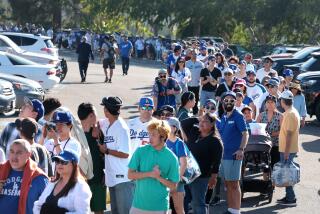End of an Era as Dodgers Trade Brown to Yankees
The Dodgers agreed to trade pitcher Kevin Brown, baseball’s first $100-million player, to the New York Yankees on Thursday, major league sources said, marking the end of a turbulent five seasons in which Brown was frequently injured and the Dodgers never reached postseason play.
Brown, 38, joined the Dodgers five years ago today, lured by club executives eager to restore the franchise to championship form under its then-new owner, Rupert Murdoch’s News Corp., and replace traded marquee superstar Mike Piazza.
Brown’s departure comes as News Corp., which also owns the Fox media empire, seeks to complete a deal to sell the Dodgers to Boston developer Frank McCourt and the Dodgers try to keep their payroll from rising above last year’s $110 million.
“I think the Fox era symbolically started with the trade of Mike Piazza and ended [Thursday] with the trade of Kevin Brown,” said David Carter, a sports business consultant who teaches at USC.
The deal may also serve as a commentary on the lurching economics of baseball, as some teams restrain themselves, others retrench, and two -- the Yankees and Boston Red Sox -- seemingly try to spend each other into oblivion.
In 1998, the Dodgers agreed to pay Brown $15 million a year for seven years and even provide him with the use of a private jet so he could visit his family in Georgia when he wasn’t pitching.
Rival general managers called the contract excessive, but it came to signal a new round of profligacy by several major league teams paying nine-figure sums, topped off by the Texas Rangers’ $252-million, 10-year deal with shortstop Alex Rodriguez in December 2000.
Brown was never able to duplicate the success he attained on two of his previous teams, the 1997 World Series champion Florida Marlins and the 1998 National League champion San Diego Padres. With the Dodgers, he showed flashes of dominance -- he won 14 games this season while losing nine -- but spent long periods on the disabled list and endured heated criticism by fans and sportswriters.
Dodger General Manager Dan Evans, reached Thursday night at baseball’s winter meetings in New Orleans, declined to discuss the trade until it becomes official. Attempts to reach Brown were unsuccessful. His agent, Scott Boras, said Brown was considering the situation and discussing it with his family.
The deal would send Brown to New York for pitcher Jeff Weaver, two minor-league prospects and $3 million, assuming Brown waives his no-trade clause and the players pass their physicals, baseball officials said Thursday. Brown is expected to sign off on the trade.
The move will save the Dodgers $15 million over the next two seasons -- Weaver is owed almost $16 million -- giving the team some spending room to improve an offense that was the worst in the major leagues last season.
As the Dodgers and other clubs seek to limit spending, the Yankees and Red Sox are in the midst of an escalating off-season battle for top players, with little regard for the bottom line.
New York’s payroll is expected to approach $200 million in 2004, after topping $165 million last season, the highest total ever in U.S. professional sports.
The Red Sox fired the first volley by trading for Arizona pitcher Curt Schilling last month and agreeing to pay the 37-year-old All-Star $37.5 million over the next three seasons.
Boston also is said to be interested in acquiring the Rangers’ Rodriguez, even as he is owed $180 million over the next seven years.
The Yankees’ willingness to take on Brown’s salary increased when star pitcher Andy Pettitte signed a three-year, $31.5-million deal with the Houston Astros earlier Thursday.
The Boston-New York arms race comes as teams such as the Milwaukee Brewers say they cannot survive financially unless they trim payrolls. The Brewers said recently that because of financial concerns they needed to drop next year’s payroll to $30 million.
“I think for years we’ve been talking about the dangerous economic direction the industry was headed,” said Gerry Hunsicker, Houston’s general manager. “No one wanted to believe it, but now we’re at a point where the losses have gotten so large the clubs have no choice [but to cut payroll].
“If you look at the trades this winter, most have been motivated by clubs trying to move dollars. If you have cash, you’re in the driver’s seat. Cash is definitely king this winter because most clubs don’t have it. It’s a buyer’s market because of that.”
When News Corp. bought the Dodgers from the O’Malley family in March 1998, it was viewed as a deep-pockets investor willing to do what was necessary to keep the team competitive.
As it turned out, News Corp.’s Dodgers never climbed above second place and continued a streak in which they failed to win a single postseason game since 1988.
“Anything that went wrong on Fox’s watch was Fox’s fault and anything that went right probably would have happened because of the O’Malleys -- at least that’s the way the fans looked at it,” Carter said. “It’s all about Fox establishing their regional sports network. Fox established its cable beachhead and now fans look at it like Fox tossed aside the Dodgers like an old shoe.”
Brown was an extravagant expense, according to Jon Weisman, a Los Angeles writer and editor who maintains an independent Web site featuring his commentary on the Dodgers.
“When he’s healthy, there’s no doubt about how good he is,” said Weisman, a former sportswriter. “But he’s not healthy all the time.”
More to Read
Are you a true-blue fan?
Get our Dodgers Dugout newsletter for insights, news and much more.
You may occasionally receive promotional content from the Los Angeles Times.









